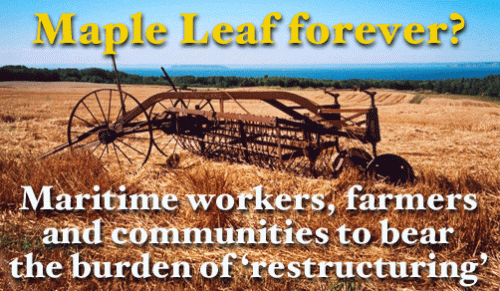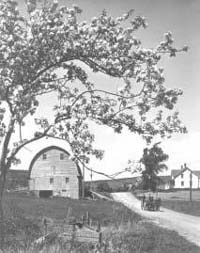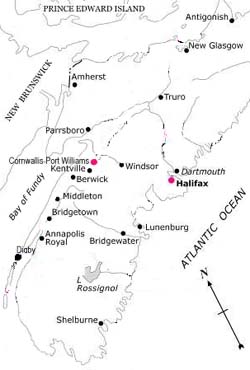
David Raymond Amos @DavidRayAmos
Replying to @DavidRayAmos @alllibertynews and 49 others
Methinks no doubt Higgy et al would agree that I would like to have a long talk with people such as Tom Soucy sometime soon Nesy Pas?
https://davidraymondamos3.blogspot.com/2020/05/virus-ready-poultry-producer-cant.html
https://www.cbc.ca/news/canada/new-brunswick/groupe-westco-poultry-covid-19-supply-chain-1.5584384
Virus-ready poultry producer can't escape supply chain shock
Groupe Westco raises 4 of every 5 chickens in province, and now it's dealing with glut of product
· CBC News · Posted: May 26, 2020 6:00 AM AT
Groupe Westco, a major poultry producer in New Brunswick, has managed to keep the coronavirus at bay, but a disruption to the supply chain as hurt the business. (Mike Heenan/CBC)
This is the first instalment in a new series from CBC Atlantic called Farming your Food: How Atlantic Canadian producers are coping in COVID. We'll take a close look at the food on your plate and how it gets there, starting with some of the people responsible for that food, the producers. We'd welcome your questions and story ideas.
When COVID-19 was declared a pandemic in mid-March, Groupe Westco was ready on the safety side but caught by surprise in their supply chain.
The New Brunswick-based poultry producer, one of the province's lesser-known business success stories, is a cornerstone of the provincial food supply, raising 80 per cent of the chicken in the province.
So it could never afford to be unprepared for a fast-spreading disease. It just had to ramp up.
"Biosecurity's really important to protect the birds and to protect the consumer," said Marco Volpé, the company's senior manager. "We were already using equipment. We were already using biosecurity measures to prevent the birds from getting sick."
Even pre-pandemic, visitors had to disinfect the soles of their shoes and then put plastic boot-shaped bags over them before stepping into a Westco barn.

Groupe Westco ramped up its safety precautions in light of the pandemic, including new screening measures for employers entering a facility. (Mike Heenan/CBC)
Inside, hundreds of chicks scurry around whenever humans intrude in the dimly lit, humid space.
Nothing that touches the ground outside can be tracked into the floor of the barn.
Westco quickly imposed additional measures such as social distancing and more hand-washing, especially at its Baker Brook hatchery.
The hatchery, where thousands of chicks are born every week, is the hub of the entire operation: it's the start of the life cycle for birds that are trucked to dozens of barns around the region and that are killed and processed about six weeks later.
"If we have one guy here, one person I should say, that has COVID, everybody's got it," said Mike Michaud, the hatchery manager.

A major poultry producer in New Brunswick was ready for pandemic safety precautions but saw its distribution system disrupted by a drop in demand. 3:21
Closing the facility would be unthinkable. It would cripple the company, disrupting the supply chain for chicken for a large part of Atlantic Canada.
"It's hard for us to shut it down," Michaud said. The specialized workforce isn't easily replaced. "It's kind of tricky. It's not like you take somebody off the street to do this job."
So far, thanks to its precautions and to New Brunswick's own relatively low COVID-19 case numbers, Groupe Westco has not seen any workers contract the virus.
"We're very lucky that we don't have any COVID," said Thomas Soucy, the CEO. "Everybody's very happy to be able to keep on working.
In fact, that success has presented another challenge during the pandemic: when demand suddenly dropped off, Westco's carefully calibrated supply chain was disrupted.
What looked like a shortage of chicken was the opposite: a glut of meat on the market that couldn't reach hungry consumers.
From a small co-op to a major player
Westco started as a small co-operative created by five local chicken farmers operating along the St. John River upstream from Edmundston, a corner of the province wedged between Quebec and northern Maine.They banded together to pool their buying power with suppliers.
Soucy, a University of Western Ontario business school graduate who grew up locally, urged them to think even bigger. They started buying up quota from farmers in southern New Brunswick who were retiring.
The next step was vertical integration: buying into other steps in the supply chain — the slaughtering, packing and selling of chicken — to reap a larger share of the profits from the value of their birds.

Groupe Westco CEO Tom Soucy says raises 80 per cent of the chickens in New Brunswick. (Mike Heenan/CBC)
They proposed to take a stake in Nadeau Poultry, the chicken processor in the village of Saint-François that had been buying their chickens. It's owned by Ontario-based Maple Lodge.
When Nadeau rebuffed Westco's offer, they found another partner, Quebec-based Olymel, to build their own slaughterhouse under a joint venture called Sunnymel.
A decade ago, Nadeau and Sunnymel were locked in a bitter legal battle. The Westco farmers were selling their chickens to another of Olymel's abattoirs in Quebec while the Sunnymel plant was under construction.
Nadeau tried to stop them, claiming Westco was trying to starve the existing plant out of existence.
Eventually things calmed down and now both processing plants operate, and even co-operate occasionally when one facility is over capacity and can't take on a shipment from one of its suppliers.
"During tough times we're able to work together," Soucy said. Nadeau officials did not respond to interview requests last week.
Westco has now become one of the dominant players in the Canadian poultry sector, with operations in six provinces. The company holds more provincially-regulated chicken quota than any other poultry producer in the country.
"Our reach is pretty significant," Soucy said matter-of-factly during an interview in the wood-panelled Westco boardroom at the head office in Saint-François.
The company slaughters 80 per cent of the chickens raised in New Brunswick, 30 per cent of those in Nova Scotia and between 15 and 20 per cent of those on Prince Edward Island. It has operations as far west as Manitoba.
Westco also raises and processes turkeys, is a co-owner of Maritime Pride eggs, which sells 70 per cent of the eggs in the Maritimes, and invests in other non-poultry ventures.

Each of the company's barns raise 500,000 chickens every eight weeks. It was forced to close 17 barns as a result of the pandemic-induced supply chain disruption. (Mike Heenan/CBC)
But raising and selling chicken is still the heart of the operation.
Dozens of its massive barns, measuring 122 metres by 12 metres, dot the winding provincial road that follows the upper reaches of the St. John River.
Each group of a dozen barns raises 500,000 chickens every eight weeks.
It was a smooth-running operation until COVID-19 hit, disrupting a delicate supply-and-demand equation.
Too much supply and not enough capacity
When social distancing and stay-at-home guidelines and orders took effect in March, consumer habits changed overnight.People stopped going to restaurants, which Westco normally supplies with various kinds of processed chicken in customized cuts. Those sales dropped "almost to nothing," Soucy said.
At the same time, cooking at home soared, leading to a spike in chicken sales at grocery stores. But that didn't fully offset the decline in restaurant sales.
Provincial marketing boards slashed their quotas by 15 per cent, leading Westco to close 17 of its barns.

Groupe Westco says grocery stores don't have the capacity right now to receive and sell the volume of product the company is producing. (CBC)
But a lot of chicks and chickens were already in the system, meaning the company suddenly had a surplus of birds it could not sell.
"Most refrigerated or cold space, it's all full. It's to a point where it was costing us a lot of money to store in outside storage," Soucy said.
Customers assumed there was a chicken shortage when they started seeing signs in their local grocery stores limiting per-customer sales, but Soucy said it's a misperception.
"That's not because there's not product in the line," he said. "We have the same amount of live production that we had, and our demand went down. So there's more volume available."
The problem has been a distribution and inventory system that could not cope with a market thrown out of whack by the coronavirus.
Large grocery store chains operate on just-in-time inventory. Food arrives, is put on the shelves and is sold and replaced with more food that has just arrived.
There's a limited amount of bays for transport trucks and not a huge amount of storage at the back of the store. There simply isn't the infrastructure, or the time, to accommodate more shipments of food, even if there's a demand for it.
"Instead of, for example, getting two tractor trailers from me a week, they may need four. But they may only be able to get three because ... they don't have enough receiving slots," Soucy said.
"So they will limit the customer. If they didn't and the customer bought in bulk or bought too much, they would not have enough for everybody."
A cornerstone of the economy
Westco managed to avoid major job losses when it closed its 17 barns in response to the quota reduction.It shifted almost all its employees to positions normally filled by summer students. Only a handful of workers were laid off, softening the economic blow.
Westco and Sunnymel employ 350 people and several hundred others work at Nadeau, and the Sunnymel plant alone contributes $400,000 in property tax revenue to the rural municipality of Haut-Madawaska, said Mayor Jean-Pierre Ouellet.
"When you create one job and you know that one job supports three others, that's quite an economic impact for the Haut-Madawaska. It's a very major employer and a good employer in the area," he said.

Reduced quota forced Groupe Westco to close 17 of its barns. (Mike Heenan/CBC)
What the future holds depends on the pandemic.
With economies, and restaurants, reopening, Soucy hopes that by mid-autumn volumes will bounce back and the closed barns can reopen. Marketing boards will soon set new quotas for September.
But recovering the lost 15 per cent won't happen overnight.
"We don't think we're going to be there for many months ahead of us," Soucy said. "We think there's some restaurants that won't make it."
In the meantime, he said, Westco will keep producing chicken and keep taking precautions to avoid letting COVID-19 into its plants.
The company has given its workers a $2-per-hour pay premium to acknowledge their efforts during the pandemic, including the requirement to wear uncomfortable masks or face shields.
"We're going through a harder financial time, but we still felt we needed to compensate that in some way," he said. "It's a difficult situation. It's difficult for them.
"I certainly want to give them a thank-you for coming to work every day and feeding the people that we've fed and people that relied on us for years, and permitting us to keep our clients."
85 Comments
Commenting is now closed for this storyDavid Amos
Methinks no doubt Higgy et al would agree that I would like to have a long talk with people such as Tom Soucy sometime soon Nesy Pas?
Ray Oliver
Reply to @David Amos: Higgs doesn't know who you are. Time for another staycation up in Restigouche
Lou Bell
Reply to @David Amos:
I'd imagine Soucy has no time for you , like most you THINK want to
talk to you ! Methinks Yethinks WRONG !!
Ray Oliver
Reply to @David Amos: what a legacy you leave in NB. I've been here since 1783. You embarrass your "clan" in a half hour
https://tonyseed.wordpress.com/2007/04/05/maple-leaf-forever-1-maritime-workers-farmers-and-communities-to-bear-the-burden-of-%E2%80%98restructuring%E2%80%99/
Maple Leaf Forever (1) : Maritime workers, farmers and communities to bear the burden of ‘restructuring’
Future
of 380 workers from the Canard plant still remains uncertain as some
may be forced to relocate and/or seek different types of work, while
others destined for the Berwick plant will join workers who have lacked a
union contract since 2005. News commentary by TONY SEED and ENA
BOUTILIER
HALIFAX
(5 April 2007, updated 1 May 2007) – HERE is an old, familiar story:
workers, farmers, their families and communities are being asked to bear
the burden of the striving of a large food multinational to maximize
its record profits, and the government leaps forward, not to sit idly
by, but to consciously participate in the placating of that monopoly. As
old is the story is, it takes new form far too frequently, as it is
doing so once again in Nova Scotia in the winter and spring of 2007.
Maple Leaf Foods, part of the McCain
family business empire, announced on 16 January that they would close a
poultry processing plant in the rural village of Canard, in the Minas
Basin of Nova Scotia’s Annapolis Valley, effectively laying off all 380
of the plant’s workers as of 27 April. The corporation claimed that the
50-year-old facility is too old to be run profitably, and that such a
prospect would require the doubling of its current productive capacity.
The shut-down is the latest in a series of closures of food processing
plants in the Annapolis Valley.
The sudden move is devastating, affecting the right-to-be not
only of the workers, but also of farmers and the community. The plant
is said to have a payroll worth about $11 million and economic spinoffs
worth about $40 million to the surrounding communities.
The decision by the Toronto-based monopoly
also directly impacts on Valley farmers, as well as poultry producers
in Prince Edward Island, both of whom are facing a vicious cost-price
squeeze.
The Canard facility produces fresh poultry
products, including branded and private label branded chicken,
primarily for customers in Atlantic Canada. It processes approximately
250,000 locally-grown chickens each week, which came from about 20
poultry farmers. The closure of the Maple Leaf operation leaves rival
ACA Co-operative as the only federally-inspected Nova Scotia processor.
It has agreed to take 40,000 birds from a handful of farmers. Some 83
poultry farmers in the province produce about 43 million kilograms of
chicken each year, according to the Chicken Farmers of Nova Scotia.
Others are having to export to New Brunswick and Nadeau Poultry of St.
Francois-de-Madawaska, owned by Maple Lodge Farms of Ontario – which
means higher shipping costs. And its parent company is the third-largest
chicken processing company in Canada.
Maple
Leaf Foods is owned by Wallace McCain, formerly co-CEO of McCain Foods,
along with the Ontario Teachers’ Pension Plan. The corporation is also
one of Canada’s largest agribusinesses, Canada’s largest pork and
poultry processor – and also owns poultry and hog farms across the
country. This multinational employs approximately 24,000 people at its
operations across Canada and in the United States, Europe and Asia, and
had sales of $6.1 billion in 2005. Its 2003 merger with rival Schnieders
Foods gave it control of 80 per cent of the pork-packing industry in
Canada.
In response to the announced closure of
the Canard plant, the Nova Scotia Department of Education set up a
“transition office” at the plant in what it said was an effort to
explore career prospects and retraining possibilities for employees, as
well as an effort to offer consultation on issues like employment
insurance. The office was being set up in partnership with Maple Leaf
Foods, the United Food and Commercial Workers Union, and Service Canada.
As of press time, only 58 workers have found other jobs, and less than
60 per cent of workers had responded to the employment and training
services being offered.
Middleton; rising unemployment in the Annapolis Valley
The closure of the Canard plan is, in
various ways, merely the tip of the iceberg wreaking havoc in rural Nova
Scotia. In the great fertile Annapolis Valley prosperity, like a
guardian angel, is supposed to dwell. Here is great wealth in fat herds
of cows, pigs and chickens, in fruit, vegetables and all manner of
lesser farm produce. Truly a fat land and of course its inhabitants are
well off; jolly, contented farmers. At least so say the newspapers, real
estate sharks and retirement pamphlets issued by the counties courting
well-off seniors to retire to the Valley. But stores are being boarded
up and schools closed.
For the Annapolis Valley, the shutdown is
part of a calamitous series of plant closures stretching back to 2003.
Just the previous week, a decision by TRA Foods, owned by the Sobey’s
family empire – “due to internal restructuring and job realignments” of
their whole sale division – cost another 30 jobs due to Sobeys’ closing
its administrative offices in the town of Middleton, also in the
Annapolis Valley.
TRA
Foods began operating in 1950 as a dry grocery products wholesaler in
Middleton and was purchased by Sobeys Inc. in 1957. Sobeys is the second
largest retail food distributor in Canada with annual sales of over $12
billion while employing 32,000 people. Since then, TRA has expanded
into all of Atlantic Canada as a wing of the Sobeys’ empire. According
to Canadian Grocer E-Newsletter (December 15, 2006), Sobeys’
parent Empire Company reported a profit rise in the 4th quarter of 2006,
with earnings reaching $57.2 million, up from $48.6 million a year ago,
with revenues reaching $3.31 billion (up 2 per cent).
Port Williams
In
2004 the closure of the last vegetable canning operation in Atlantic
Canada, Avon Foods in the nearby village of Port Williams, not only
affected workers but also producers who lost a large share of their
income.
With
the closure of the Britex textile plant at Centrelea near Bridgetown in
October, 2003 with just over $4.4 million in unpaid loans to the
provincial government, and Maple Leaf’s Shur-Gain livestock feed mill in
Port Williams (and in Sussex, NB and in PEI) in 2005, the resulting
layoffs put over 200 people out of work. According to Statistics Canada,
Annapolis Valley employment is up just slightly from January, 2006 but
the unemployment rate is down substantially from 9 per cent. Six per
cent is the lowest January unemployment rate recorded for the Annapolis
Valley for at least the last 20 years but this figure is a mirage. This
is because the Valley’s labour force is smaller this year by almost
2,000 people, a figure that does not include the 380 workers to be laid
off this April at Canard by Maple Leaf Foods.
Maple Leaf (Larsen’s) in Berwick
Meanwhile,
400 workers employed by a Maple Leaf-owned pork processing plant
(Larsen’s) in the town of Berwick (pictured), further south in the
Annapolis Valley – represented by the Atlantic Meatpackers’ Union (AMU) –
voted on 17 January, the day after the Canard announcement, to reject a
contract that was offered by the company. Larsen’s workers had been
without a contract since September 2005, a 16-month period.
Widespread speculation is also being
generated about this plant’s future. News of difficulties for workers in
both Canard and Berwick come as Maple Leaf is now aiming to consolidate
its meat processing operations throughout the country in Brandon,
Manitoba after having decided in October, 2006 to exit the pork export
industry. And much of the Larsen’s plant production is geared for
export.
Larsen’s takes 80 to 85 per cent of Nova Scotia’s pork production from hog producers.
Despite the pressure on the workers, Ted
Jones of the AMU said, “We weren’t scared – we’ve heard the rumours
every time we’ve been through a contract, and we’re tired of them. We’ve
been through wage freezes, rollbacks – we deserve it for all we’ve done
to help the company get through things.”
Maple
Leaf offered a 25 cent hourly increase in September of both 2007 and
2008, but did not live up to union demands in terms of pension and sick
benefits, retroactive money and signing bonuses. Many workers are leery
of the long-term future of the Berwick plant. Superficially, there are
no apparent plans to close the facility as in the case of Canard. In
fact, plant manager Mike Larsen publicly stated he will consider hiring
former Canard workers in the Berwick plant, a statement made shortly
before news broke of the creation of the Canard facility’s transition
office on January 24. Nevertheless, he acknowledged “quite a migration
of Larsen’s workers” has taken place. The AMU’s Jones adds: “We’ve lost
100 people in there the last year,” citing the lure of Western Canadian
jobs and regional insecurity as enough incentive to attract even settled
families. “It’s hard to get people.”
The tombstone of rural Nova Scotia
The rationale of Maple Leaf’s current
“restructuring” efforts is strongly reminiscent of actions taken by
other key monopolies in the food processing industry. In 2005, for
instance, Québec pork and poultry producer Olymel, a division of
Qu?bec’s huge La Co-op fédérée and a rival to Maple Leaf Foods,
threatened to consolidate operations in St. Bonifice, Manitoba (in a
joint plant with Saskatchewan-based Big Sky Farms and Manitoba’s Hytek).
It declared it wanted to close several facilities in Québec on the
grounds that it needed to modernize its production units in the interest
of being both nationally and globally competitive. Recently, on 13
February 2007, it forced Olymel workers in Vallee-Jonction, Quebec, to
vote to accept massive wage cuts in order to return to work under the
spectre of the threat of closure.
In the case of workers from the Canard
plant in Nova Scotia, their future remains uncertain. Some may be forced
to relocate and/or seek different types of work or go down the road,
while others destined for the Larsen’s plant in Berwick will join the
other workers who have lacked a union contract since 2005. The burden of
the crisis is put on the backs of these workers, the poultry and hog
farmers, the main street business people and their communities, and
their very right to be, leaving ruin in our rural communities.
Even if they are lucky enough to remain
employed, workers are being shuffled from one location to another
without regard to the costs of transportation and relocation, while
small rural communities such as Canard and Port Williams suffer a
decimation of a significant part of its economic base – all under the
watchful eyes of our elected officials, working hand in hand with one of
the region’s richest business families. In the same way, the monopolies
shift meat and feed grain supply from region to region and country to
country and strategically locate their operations to maximize profits
and externalize costs, regardless of the consequences to either the
farmers, the region or the nation. Meanwhile, they blame the wages of
the worker and the prices of the farmer or the catch-all euphemism of
“rising energy costs” for rising food costs to the consumer.
The
vertical integration of the food industry means that a handful of huge
packers, through their direct and indirect control of corporate
industrial farms, and the elimination of the “single desk” selling
system, dictate monopoly prices through contracts with large beef and
hog producers, eliminating the market power of the small- and
medium-sized family farm producers. Through exclusive contracts with the
supermarket chains – Sobeys, Atlantic superstores and Wal-Mart, etc. –
this cartel is squeezing all non-monopoly competition, from independent
meat-packing facilities to independent retail chains such as the co-ops.
“Similarly, organic agriculture must be destroyed,” notes the Union Farmer Monthly to
cut off the escape route from the factory-style farm.” They provide
“forms of resistance, and they provide a working counter-model.”
At the same time, the consumer who tries
to respond to the niche marketing programs to “buy local” is blocked by
generic private-label or unbranded goods, such as Sobeys “Our
Compliments” and Atlantic Wholesale’s “President’s Choice”, which make
it impossible to discern where and from whom the product originates.
Protection of the local marketplace and
the local market infrastructure to facilitate direct links between the
farmer and the consumer is important, but the “buy local” program seems
to have another role: to suggest that the source of the problem lies
with the tastes of the consumer, that the problem is primarily one of
consumption, and that the solution lies in appeals to the non-existence
conscience of the supermarket chains. It depoliticizes the consumer from
taking a stand with farmers and labour. Of course, Sobeys et al
do “buy local”, mostly perishables, cheaply positioned behind the major
display and prime shelf space paid for by the large food monopolies.
This is symptomatic of a larger national
political problem. All political decision-making is in the hands of
relatively few people – all of whom accept without question the dominant
paradigm of global competitiveness as a goal to be pursued at all
costs. Parties in power federally, in Alberta, and elsewhere, most
notably in the US, are waging an extensive campaign to turn over all
aspects of food production and distribution to these transnationals such
as Maple Leaf Foods, Cargill and Tyson. In the name of
“competitiveness”, “efficiency”, “free market” and “food security”
agencies such as the Fraser Institute, the Calgary School, the Frontier
Centre, and the Atlantic Institute of Market Studies are campaigning to
eliminate equalization payments and price support to small farmers. The
defence of private wealth and its future expansion is the basic
consideration of these parties and “think tanks.” The monopolies lay off
workers and block their unionization, wipe out farmers, and devastate
communities and entire regions because they can.
What
official political leadership in this province or the nation has had
the courage to uphold its responsibilities towards the society, to
defend the public good and stop the attacks of the monopolies? You want
the supercentres open on Sunday? There’s no problem: Corporate Research
uses polling to prove the case; the media, lusting for Sunday
advertising, campaign for consumer secularism; the police tolerate
violations of bylaws by the supercentres; and the big tourist interests
justify it as a means of attracting cruise ships. In the name of global
competitiveness, the workers in Berwick – as at Vallee-Jonction, Québec,
or in the forest sector and their communities, such as what transpired
with Stora Enso in Port Hawkesbury last year – are being intimidated
with the long-term possibility of closure into accepting working
conditions that they would not accept in any other circumstance.
The
fruits of the earth, the rights and existence of workers, the small to
medium-sized holdings of the farmers, their communities and even the
factories and mills owned by big capital are considered dispensable
within the fundamental aim to defend and expand monopolies and their
empires. The sole solutions being proffered are to go down the road or
the canard of buying fresh food and farm products locally.
Self-sufficiency in food is an important
element of national sovereignty. The cases of Canard and Berwick are a
graphic illustration of the need for new political leadership – a
leadership that stops paying the rich, develops a national economy
including regionally-self reliant agriculture and food, upholds social
responsibility, invests in social programmes – and new political
mechanisms that make such governance possible.
Only then can this old, familiar story truly become an artifact of the past.
Originally published on Shunpiking Online, May/June 2007






No comments:
Post a Comment